|
|
|
Sort Order |
|
|
|
Items / Page
|
|
|
|
|
|
|
| Srl | Item |
| 1 |
ID:
127636
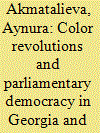

|
|
|
|
|
| Publication |
2013.
|
| Summary/Abstract |
The media of Kyrgyzstan described Georgia after the Rose Revolution of 2003 as a country that has made giant strides in economic recovery, suppressing corruption, and reform of its police and education system. The two countries increased their cooperation after the Tulip Revolution of 2010 in Kyrgyzstan; today, it has taken the form of an exchange of diplomatic and political experience and youth programs. Trade turnover between the two countries is expected to top $1.4 million.
These two Soviet successor-states, which adhere to different sociocultural and economic traditions, chose a practically identical road leading first to the presidential form of government and then to parliamentary democracies. This choice made after the color revolutions of 2003 in Georgia and 2005 and 2010 in Kyrgyzstan was suggested by the universal model of democracy that had gained popularity all over the world and was primarily a mechanism for legitimizing the power of the new people inside and outside the country. So far, parliamentary democracy in both countries has not developed enough to produce unambiguous results. It is much more important to understand how the changes were accepted and substantiated through an analysis of public discussions, discussions in the media and on the Internet, as well as in official documents, interviews, and statements by the leaders.
|
|
|
|
|
|
|
|
|
|
|
|
|
|
|
|
| 2 |
ID:
090420
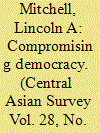

|
|
|
|
|
| Publication |
2009.
|
| Summary/Abstract |
This article argues that the since the Rose Revolution, the Georgian government led by President Mikheil Saakashvili has created a false dichotomy between democracy and state building. They have prioritized the latter. Initially, in areas such as reducing bureaucracy, combating petty corruption, improving tax collection, service delivery and infrastructure, the government succeeded in rebuilding the Georgian state. However, because issues of democracy were ignored, efforts to strengthen the Georgian state were not as successful as they might have been. Moreover, the absence of sufficient democracy has contributed to poor decision making, most notably in the run-up to the August war, which ultimately has undermined the major state building accomplishments in Georgia since 2004. Accordingly, any efforts to repair the damage from that war and rebuild the state will be unsuccessful unless they incorporate meaningful democratic reforms.
|
|
|
|
|
|
|
|
|
|
|
|
|
|
|
|
| 3 |
ID:
116311
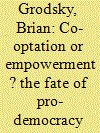

|
|
|
|
|
| Publication |
2012.
|
| Summary/Abstract |
Western governments spend millions of dollars annually supporting the non-governmental sphere, and especially pro-democracy organisations, in non-democracies. The essay explores how inclusion of pro-democracy organisations into the state after democratic breakthrough can enhance or inhibit democratic consolidation, arguing inclusion can actually weaken the NGO community by creating rifts between one-time partners with suddenly disparate agendas. This argument is applied to the case of Georgia following the 2003 'Rose Revolution'. Evidence is based on elite interviews conducted in summer 2007.
|
|
|
|
|
|
|
|
|
|
|
|
|
|
|
|
| 4 |
ID:
073661


|
|
|
|
|
| Publication |
2006.
|
| Summary/Abstract |
Success for Georgia's nascent democracy would be a major success for the democracy-promotion efforts of the United States, which has hailed the democratization there since the Rose Revolution as a success even as concerns have been voiced by some observers regarding the pace and direction of this effort. The U.S. policy of unconditional support for Georgia's government and its disinterest in drawing attention to the new government's democratization shortcomings call into question how serious the United States is about democracy-promotion, particularly in countries that have a semi-democratic but pro-American government. A U.S. approach to Georgia that recognizes the challenges there and seeks to help it solve these problems will demonstrate that America is sincere in its desire to promote democracy, not just to support friendly governments.
|
|
|
|
|
|
|
|
|
|
|
|
|
|
|
|
| 5 |
ID:
125221


|
|
|
|
|
| Publication |
2013.
|
| Summary/Abstract |
A strange thing happened in Georgia last October. After an extremely contentious election season in which Bidzina Ivanishvili, the leader of the opposition, was stripped of his citizenship and fined millions of dollars, in which opposition activists were regularly harassed and arrested, and in which the media was dominated by the government, the opposition surprised many Western observers and governments by scoring a decisive victory and winning control of Parliament. Then an even stranger thing happened. The day after the election, the ruling party of Georgia, President Mikheil Saakashvili's United National Movement (UNM), gracefully conceded defeat to the new Prime Minister Ivanishvili's Georgian Dream (GD) coalition.
|
|
|
|
|
|
|
|
|
|
|
|
|
|
|
|
| 6 |
ID:
111136
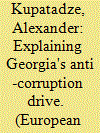

|
|
|
|
|
| Publication |
2012.
|
| Summary/Abstract |
This article explains Georgia's achievements against rampant corruption that plagued the country for decades. It demonstrates how Georgia has moved from being a 'failed state' to the state with low corruption rates following the Rose Revolution of 2003. It is argued that several internal and external drivers motivated Georgian leadership to fight corruption in the post-revolutionary setting, including drawing legitimacy from anti-corruption campaign and using it for political purposes, 'the West' as allure and desire to drift away from Russian trajectory of development.
|
|
|
|
|
|
|
|
|
|
|
|
|
|
|
|
| 7 |
ID:
111134


|
|
|
|
|
| Publication |
2012.
|
| Summary/Abstract |
This article places new works in the context of the major implications arising from Georgia's Rose Revolution and the war of August 2008 for both Georgia and the wider Euro-Atlantic area.
|
|
|
|
|
|
|
|
|
|
|
|
|
|
|
|
| 8 |
ID:
094368


|
|
|
| 9 |
ID:
123287


|
|
|
|
|
| Publication |
2013.
|
| Summary/Abstract |
The opposition Georgian Dream coalition's upset victory in Georgia's October 2012 parliamentary elections displaced the then-ruling United National Movement as well as the "competitive authoritarian" model it had instituted. While the future of Georgian democracy remains an open question, the elections may offer transferrable lessons for democracy promotion in other competitive authoritarian systems. In particular, Georgian Dream was able to successfully use leadership, messaging, and international engagement to pose the first meaningful challenge to the ruling party since the 2003 Rose Revolution. Georgia's recent experience also highlights the need for better-tailored policies to address the hybrid nature of the competitive authoritarian model.
|
|
|
|
|
|
|
|
|
|
|
|
|
|
|
|
| 10 |
ID:
134119
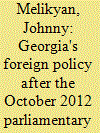

|
|
|
|
|
| Publication |
2014.
|
| Summary/Abstract |
The author looks at the key foreign policy trends and changes that became obvious after the parliamentary elections of October 2012.
The article's first part describes Georgia's foreign policy under President Saakashvili when Georgia received its first conceptual documents-the National Security Concept and the Military Doctrine-both geared toward Europe and the closest possible cooperation with NATO, revised regional relations, and a new agenda.
The second part deals with the changes in Georgia's foreign policy that took place after the presidential elections of 1 October, 2012, when the opposition Georgian Dream Coalition won the majority of seats in the Georgian parliament and the post of prime minister for its leader, Bidzina Ivanishvili. The newly emerging relations between Georgia and Russia and the efforts of the Georgian leaders to resume their dialog with Moscow are also analyzed.
The concluding part offers an overview of Georgia's relations with the European structures, its progress toward an association with the European Union, the course of the talks, and the way this association will affect the main spheres of the country's life.
|
|
|
|
|
|
|
|
|
|
|
|
|
|
|
|
| 11 |
ID:
111135


|
|
|
|
|
| Publication |
2012.
|
| Summary/Abstract |
This article focuses on the paradoxes inherent in the Rose Revolution in Georgia. The Rose Revolution and its colored companions precipitated two disappointing reactions in the former Soviet space: first, disillusion with popular democracy movements, and second, what Vitali Silitsky calls 'preemptive authoritarianism', or the ability of post-Soviet regimes to anticipate popular challenge. I connect the ideology and style of the Rose Revolution with the constitutional crisis of November 2007 in Georgia, and with the Russo-Georgian war of August 2008.
|
|
|
|
|
|
|
|
|
|
|
|
|
|
|
|
|
|
|
|
|